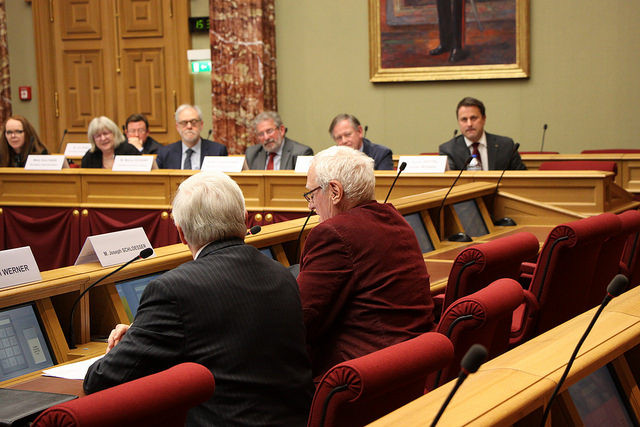Two petitions were debated in parliament last week which represent a growing chasm in Luxembourg society: one requested the primary official language be changed to Luxembourgish at some point in the future, and the other opposed it.
Public petition 698
What motivated Lucien Welter to submit his surprisingly successful petition to promote the use of Luxembourgish and make it the first administrative language?
His prepared speech in front of MPs was rather measured and had some reasonable proposals to promote the use of Luxembourgish, which is also a goal of the coalition government, such as having a uniform rule for the languages used for the names of street signs.
However, the key demands were a direct challenge to our multilingual heritage and reality. When he and his colleague answered MPs questions freely, one could sense a deep unease with the way Luxembourg society has evolved and the direction it takes:
“It is important that the people who live here speak Luxembourgish, that we can communicate with each other, that we know where we stand. What do we live for, what is our country? I don’t talk about abolishing our multilingual culture. I am proud of the fact that I speak Luxembourgish, German, French, a bit of Italian, English, that I am multilingual. Every country has their own language, why not Luxembourg? Why should we throw this away? But you need to be aware that we are our own country and we should nurture it. If you look at how many people are projected to live here in the future--Luxembourgish people cannot make enough babies to help our language survive--I am sorry! We are obliged to have foreign workers--as Luxembourgish is our language of integration, let’s take it and start with that.”
The diffuse fears that Luxembourg society is changing to a point where it is unrecognisable have been captured by this petition and are evidenced by its popular support. Some Luxembourgers are miffed when they have to switch language to make themselves understood, and when they cannot express themselves as freely as they would be able to in their mother tongue.
There is a perception in some parts of the population that foreign residents and cross-border commuters are at an advantage because of the increased use of French and of their better command of that language, both in everyday life and in critical situations such as in courts and hospitals.
Public petition 725
The counter-petition by Joseph Schlesser and Henri Werner argued instead that both French and German were part of our national identity and that it was nationalistic to make it the first administrative language:
“Under every occupation, we managed to get along with foreign elements, whether it was Spanish, Austrian, Dutch or Belgian. We managed to found a state and continue to develop further. After WWII, we managed to become a very successful country. Our great strength is our smallness: because we are small, we are open, we can integrate influences, we can speak more than one language. There is a malaise with French. People realise when reading legal texts that they haven’t really learnt that language. There is a feeling that French is a foreign language, but it isn’t--it has been present for centuries. Without French, Luxembourg would not be independent.”
While Welter and his colleagues might be accused of being anti-elitist, Schlesser and Werner may equally be accused of being elitist. French was historically more prominent among the educated classes and is still the bane of many students’ existence in Luxembourg’s lycées.
We need, as the LSAP MP Alex Bodry said, an overhaul of French teaching which brings back the joy of learning a foreign language.
Three revelations
The debates have highlighted several things: firstly, that our much lauded use of several languages in daily life does not come so easily to everyone in Luxembourg; secondly, that identity and language are closely linked, probably to the point where as long as one can speak Luxembourgish, one is considered assimilated; and thirdly, that our multilingual society is no longer as accepted by a certain group of voters as we may have assumed.
